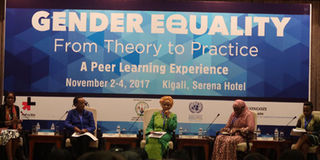Gender stakeholders: Financial inclusion crucial for women empowerment

What you need to know:
This was revealed on Friday, November 3, during a three-day-conference on Gender Sensitive Budgeting in Kigali, Rwanda, organized by Uongozi institute and the International Monetary Fund (IMF).
Kigali. Stakeholders in gender development say women can be empowered economically through financial inclusion.
This was revealed on Friday, November 3, during a three-day-conference on Gender Sensitive Budgeting in Kigali, Rwanda, organized by Uongozi institute and the International Monetary Fund (IMF).
During the conference, there was a clamour from among stakeholders that women should have access to mobile phones, bank accounts and credit from the microfinance sector.
Special Seats Member of Parliament (Chadema), Ms Catherine Ruge, said for instance, that even as there was growth in mobile money services and commitment to addressing gender disparities women continued to be left behind.
She noted that gender was a crosscutting issue in the sense that it went to other areas such as education and economic empowerment.
Ms Ruge referred to data showing that Africa accounted for 63 per cent of active mobile money accounts globally yet women represented approximately 50 per cent of the mobile market.
“Ignoring women means missing out on a great opportunity,’’ she noted.
During her presentation on ‘Leverageing data on financial access’, Ms Stephanie Oula from Data2X, said stakeholders needed to work together to realise the full benefits of financial inclusion.
The conference inspired by the theme, “From theory to practice,” aims to spread best-practices in promoting gender equality
Another MP, Susan Lyimo, said that gender equality and women’s empowerment was key to achieving United Nations Sustainable Development Goals (SDGs), specifically SDG 5 - Gender Equality.
She said it was important to accelerate the budgeting that was sensitive to both genders, urging the speeding up of digital and financial inclusion for women.
The Uongozi Institute Head of Research and Policy, Mr Dennis Rweyemamu, said that gender issues were critical, with studies showing that if women were empowered, societies would have greater potential to prosper.
“That’s why we believe we should bring this to the forefront for leaders to come from all over Africa to have a contribution and leave with a more collective understanding with their countries’ contexts in mind,” he said.
Rwanda’s Minister for Gender and Family Promotion Espérance Nyirasafari said the country has for 20 years seen significant progress in gender equality and women empowerment, which she attributed to the good leadership and strong political will.
She mentioned achievements in Rwanda such as the revised law governing land which grants equal rights between women and men on land access, ownership and utilization.
The land reform allowed 26 per cent of women to own land and 54 per cent to own land with their spouses.
She noted that land ownership was one of the critical and historical transformative opportunities that had been achieved for women economic empowerment in Rwanda, allowing poor and traditionally marginalised women to be able to access loans.
Financial inclusion for Rwandan women increased from 36 per cent in 2012 to 62.9 per cent in 2016, she said
The representative of UN Women Rwanda, Mr Fatou Lo, said more efforts were needed if nations were to acquire gender parity.
Mr Lo said persistent and deep seated inequalities which were not easy to detect needed to be addressed.
UN Women director for Eastern and Southern Africa Izeduwa Derex-Briggs said that it was crucial for all stakeholders to come together to exchange knowledge and make bold steps toward achieving gender equality.
In Africa, economic empowerment is one area that still faces a large gender gap. Women are just getting to earn what their male counterparts earned in 2006.
Across Africa, women also represent 79 per cent of agricultural workforce but constitute only 24 per cent of agribusiness owners.




